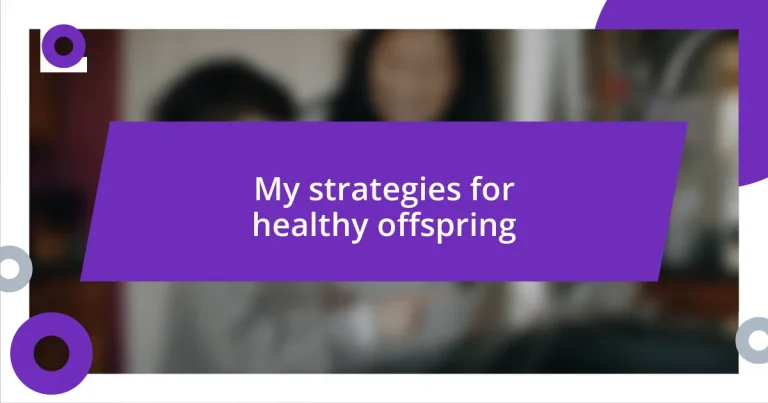Key takeaways:
- Healthy offspring require a balance of physical well-being and emotional resilience, influenced significantly by parental habits and emotional intelligence.
- Nutrition before and during pregnancy—rich in essential nutrients and hydration—plays a crucial role in both maternal health and fetal development.
- Modeling healthy behaviors, establishing routines, and encouraging family activities are key strategies for fostering lifelong healthy habits in children.
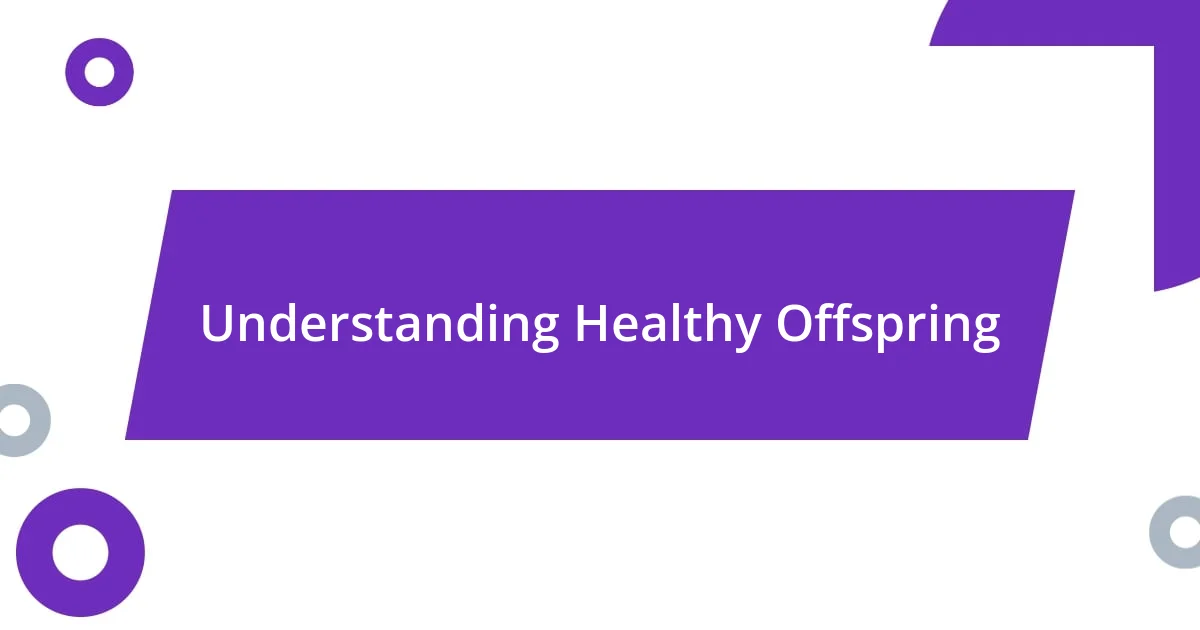
Understanding Healthy Offspring
When I think about what it means to have healthy offspring, one of the first things that comes to mind is the balance between physical well-being and emotional resilience. I’ve often reflected on how my upbringing shaped my mindset; the lessons in nutrition and coping strategies my parents imparted have lingered with me. Do we fully realize how much our own habits and emotional intelligence influence our children’s future health?
There’s a profound connection between a child’s emotional environment and their overall health. I remember a moment when my child came home from school, visibly upset about a conflict with a friend. Recognizing their feelings and providing a space to express themselves not only comforted them but also reinforced an essential coping strategy. Isn’t it interesting how nurturing the emotional side can pave the way for a healthier life down the road?
Moreover, genetics undoubtedly play a role, but we also have to acknowledge the significant impact of lifestyle choices and parenting styles. I’ve seen friends around me adopt various approaches, from strict dietary rules to more flexible, intuitive eating, and the outcomes vary widely. What choices do you think will best suit your family’s values while fostering a foundation for healthy development? The answers seem to intertwine, creating a rich tapestry of influences that contribute to overall well-being.
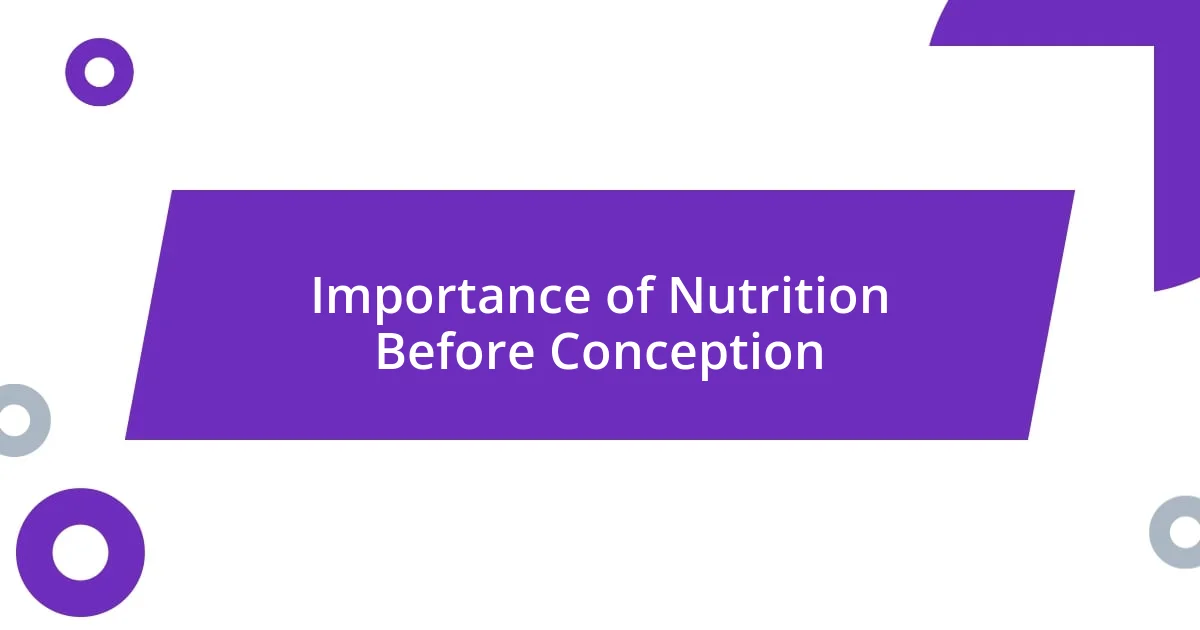
Importance of Nutrition Before Conception
Nutrition before conception can greatly influence not just the health of the parents, but also the future well-being of the offspring. During my own journey, I learned that diets rich in essential nutrients can optimize both fertility and fetal development. For instance, I recall taking extra care to ensure that my meals were filled with leafy greens, whole grains, and healthy fats. Those changes made me feel more energized, and I couldn’t help but wonder how they were positively affecting my chances of conceiving a healthy child.
A well-rounded diet can prevent potential complications during pregnancy too. I’ve had friends who emphasized the intake of folate-rich foods, like legumes and fortified cereals, during their preconception period. They often shared stories about how they felt empowered by their food choices, knowing they were creating a favorable environment for their future baby. It’s fascinating to see how something as simple as nutrition plays such a pivotal role in shaping the future generation.
Moreover, understanding the importance of hydration shouldn’t be overlooked. I personally experienced days where staying properly hydrated made a significant difference in my energy levels and mood. Drinking enough water not only supports physiological processes but can also contribute to emotional well-being. With that in mind, it begs the question: what nutritional habits are we nurturing to prepare for the new life we hope to bring into the world?
| Aspect | Importance |
|---|---|
| Fertility-Boosting Nutrients | Essential for enhancing reproductive health |
| Healthy Weight Management | Vital for a reduced risk of complications during pregnancy |
| Hydration | Supports bodily functions and improves mood |
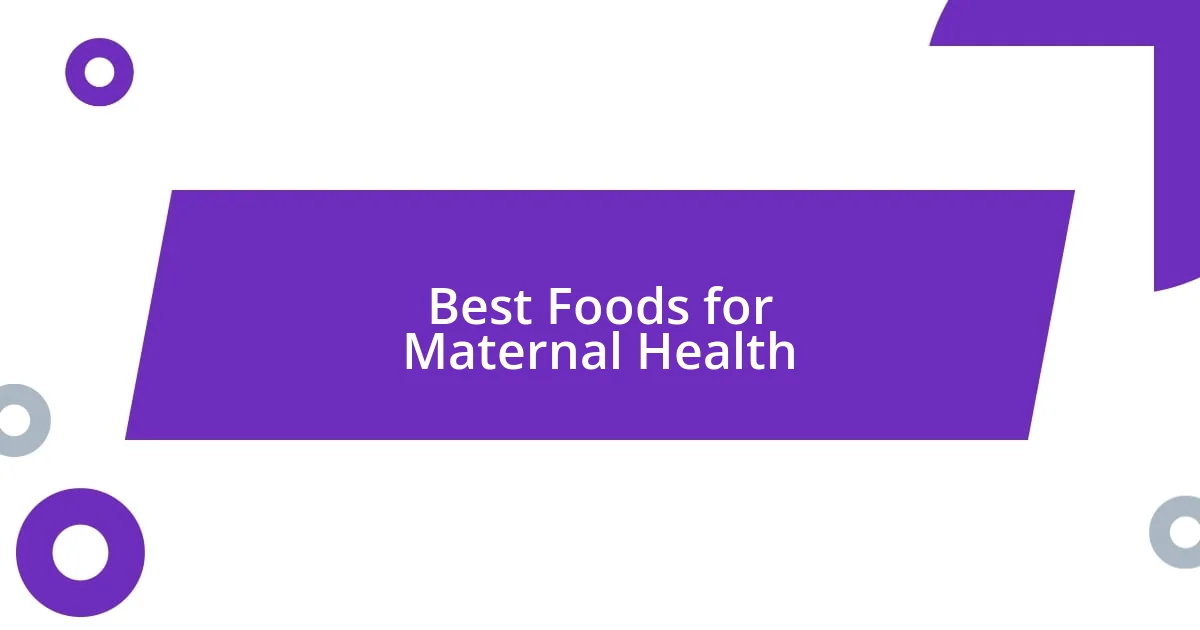
Best Foods for Maternal Health
When it comes to maternal health, I believe that our food choices can be incredibly impactful. During my own pregnancy, I focused on incorporating foods that not only nourished me but also supported the developing baby. I vividly remember the sense of satisfaction I felt after preparing vibrant meals filled with a variety of fruits and vegetables, knowing I was fueling my body—and my child—with goodness.
- Leafy Greens: Packed with iron, calcium, and folate, they promote healthy blood flow and fetal development.
- Berries: High in antioxidants, they combat inflammation and protect your immune system.
- Salmon: A great source of omega-3 fatty acids, which supports brain development in the unborn child.
- Nuts and Seeds: Rich in essential fats and vitamins, they provide energy and are perfect for snacking.
- Whole Grains: Foods like quinoa and brown rice are vital for maintaining energy levels and providing fiber.
Reflecting on my own experiences, I found that incorporating these foods made a real difference in how I felt, both physically and emotionally. On days when I indulged in home-cooked meals brimming with nutritional value, I had more energy and a clearer mind. It’s fascinating how the right foods can elevate mood and create a sense of well-being, reinforcing the idea that what we eat directly affects not just us but also the health and spirit of our future children.
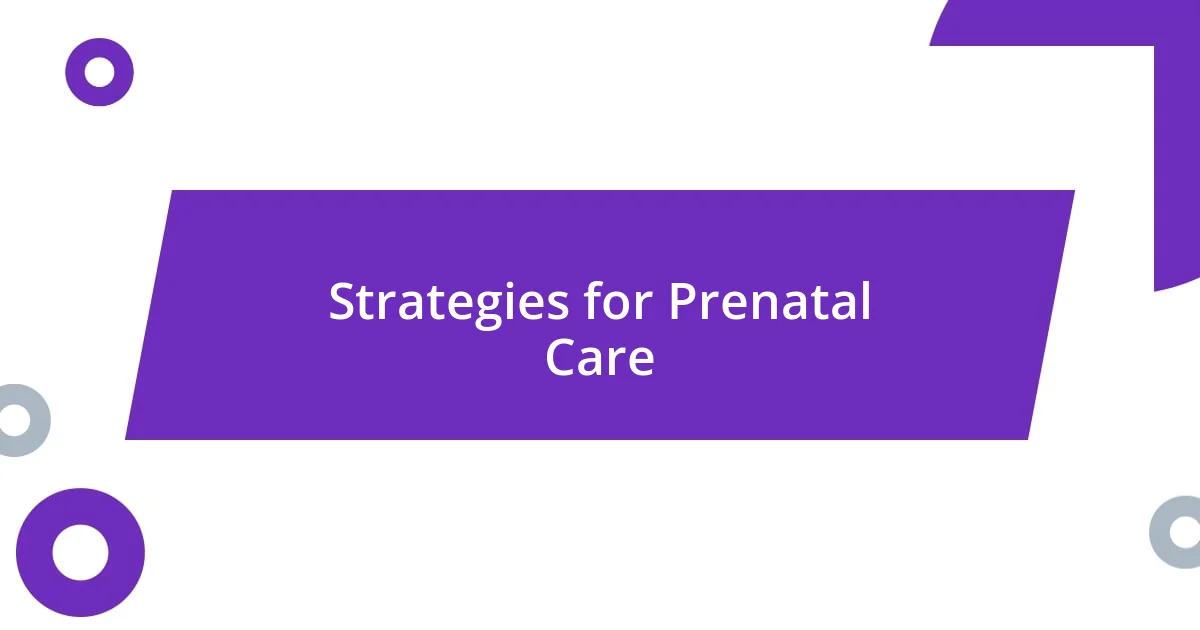
Strategies for Prenatal Care
Regular prenatal check-ups are an essential strategy for ensuring the health of both the mother and baby. I remember feeling a mix of anxiety and excitement during each appointment, but having those professional insights reassured me that everything was progressing well. It’s incredible how a simple heartbeat check can transform uncertainty into a wave of relief, isn’t it?
Monitoring vital health indicators like blood pressure and weight helps to catch any potential issues early on. I vividly recall a visit where my doctor discussed the importance of managing stress levels during pregnancy. What struck me was the emphasis on mindfulness practices—things like meditation or yoga—that can significantly impact overall health. It made me think: how often do we pause and reflect on our emotional well-being in the midst of planning for a new life?
I found that engaging my partner in conversations about our appointments helped deepen our understanding and connection. We often reviewed notes together, turning what could have been a daunting experience into meaningful discussions about our future. Building a support system around prenatal care is invaluable, making me wonder—and perhaps you should too—who you can involve in your journey to ensure the best outcomes for your family.
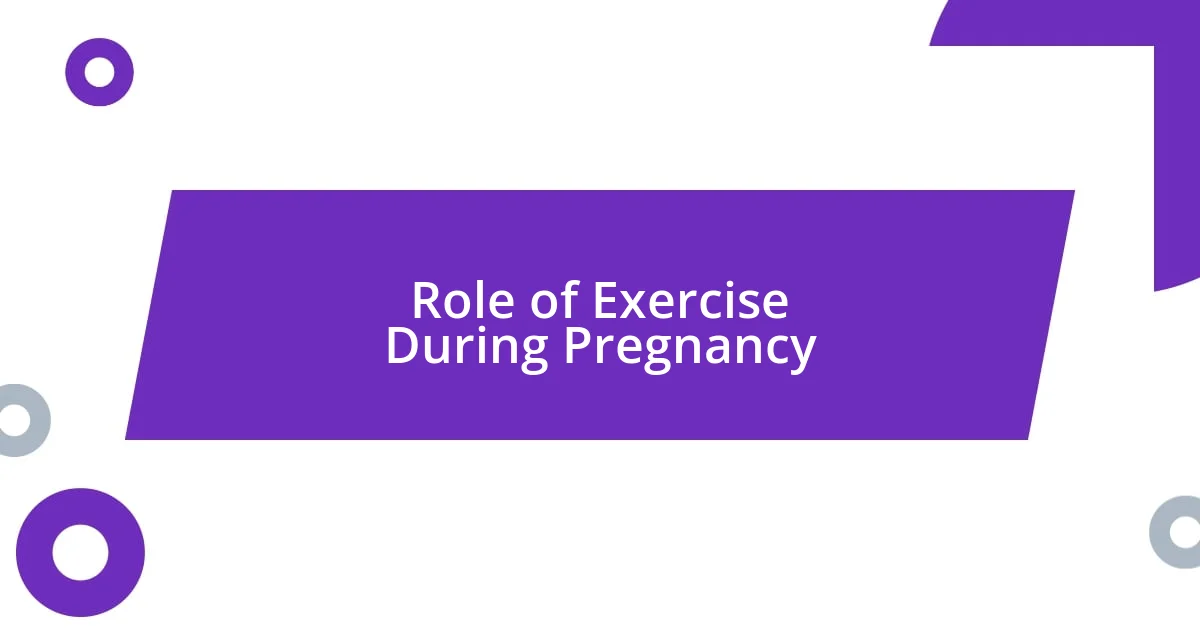
Role of Exercise During Pregnancy
Engaging in exercise during pregnancy was a game-changer for me. I remember how invigorated I felt after a brisk walk or a gentle yoga session—each movement seemed to connect me with my growing baby. It’s fascinating how something as simple as a bit of physical activity can enhance circulation and boost mood, right?
I found that regular exercise not only improved my energy levels but also reduced the common discomforts associated with pregnancy. For instance, when I incorporated stretching and light aerobics into my routine, I noticed a significant decrease in back pain. This connection between movement and relief made me wonder: could something as simple as a morning stretch truly transform how we feel during this life-changing time?
Moreover, engaging with my body through exercise strengthened my mental focus as I prepared for motherhood. I distinctly recall those moments of solitude on the yoga mat, where I reflected on the journey ahead. These exercises weren’t just about physical strength; they were also vital for nurturing emotional resilience. I often asked myself, how important is it to foster both my physical and mental health during pregnancy? The answer, I realized, was incredibly significant.
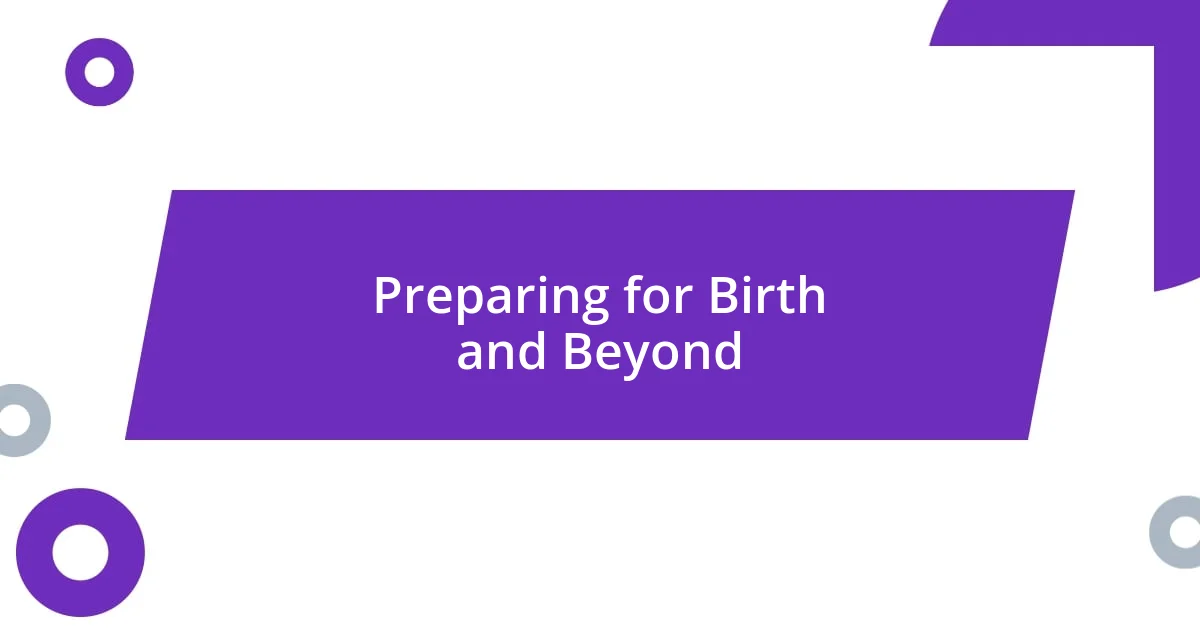
Preparing for Birth and Beyond
As I prepared for birth, I found that creating a calming environment was crucial. I remember carefully selecting soft colors for the nursery and incorporating soothing sounds that made the space feel inviting. It struck me how these simple choices could create an atmosphere that promotes tranquility for both the baby and myself; in those quiet moments, I often wondered how much our surroundings shape our emotions during such a pivotal time.
Another essential aspect I focused on was birth education—attending classes not just for the physical aspects, but also for the emotional preparation. I can recall the first time I practiced breathing techniques with my partner. Initially, it felt a bit silly, but soon it became a powerful tool. I learned that connecting over these exercises not only relieved some of my anxiety but also brought us closer together, making me think: how prepared are we, really, for the challenges of parenthood?
After considering the newborn phase, I took time to create a postpartum plan. It was vital for me to acknowledge that recovery is just as important as pregnancy. I remember writing down what support I needed from family and friends, and committing to self-care practices like regular check-ins with myself. This approach reminded me that it’s okay to prioritize my well-being; after all, how can we care for others if we don’t care for ourselves first?
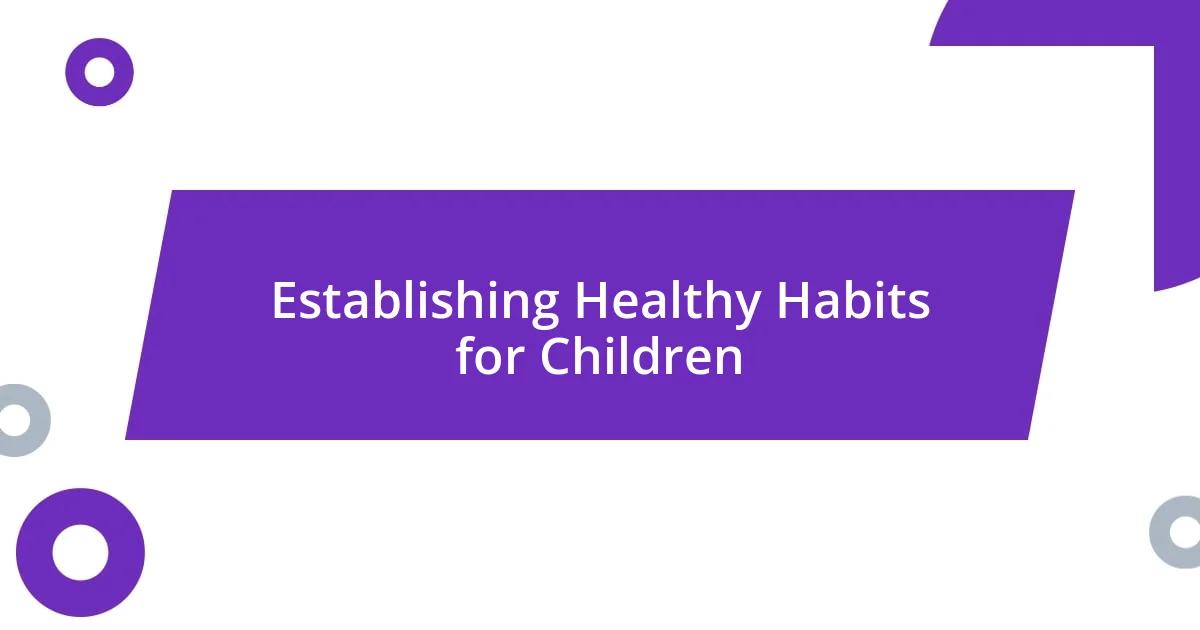
Establishing Healthy Habits for Children
When it comes to establishing healthy habits for children, I believe modeling behavior is one of the most effective strategies. I often think back to the afternoons spent cooking with my little ones; those moments were not just about preparing a meal but teaching them the value of healthy choices. Have you ever noticed how children mimic what they see? By involving them in cooking, I hoped to inspire a lifelong love of nutritious foods.
I found that setting consistent meal times made a remarkable difference. Each dinner felt special, with everyone gathered around the table—a time for shared stories and laughter while enjoying colorful vegetables. Isn’t it fascinating how food can bring us together? By making mealtime a routine, I noticed my children developed a sense of security while also learning about portion sizes and balanced diets naturally.












